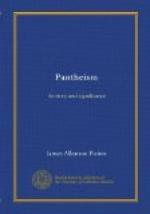“There are more things in Heaven
and Earth, Horatio,
Than are dreamt of in your philosophy.”
Or, to put it in another way, the Universe perceptible to us is only one of an infinity of Universes. By which is not meant an infinite extension of galaxies in space, but the co-existence and, so to speak, interpenetration of an infinity of modes of existence imperceptible to us.
[Sidenote: God Is Identical with the Whole of Being.]
To Spinoza, then, God is the totality of Being. But it is not to be inferred that he identified God with the visible, or with any conceivable Universe. For either of these must fall far short of infinity, and the Being of God is infinite. All I mean, when I say that Spinoza identifies God with the totality of existence, is that he regards the deity as that Perfect Being without beginning or end, whose essence it is to be, and of whom all that exists, whether known to us or not, is separately a partial, and comprehensively a perfect expression.
[Sidenote: His Doctrine of Man.]
Of more practical interest to us perhaps is Spinoza’s doctrine of man, though it would have been impossible to explain that without first indicating his idea of God. In his view, then, man is a finite mode of the two divine attributes, extension and thought. Thus both the extended body and the conscious mind have their substance and reality in God.[18] But the essence of man does not necessarily involve his separate existence as the essence of God implies Being. Of course the substance of man is imperishable because it is of God’s substance. Nay, there is a sense in which each man, being an eternal thought of God, has an aspect towards eternity or exists “sub specie eternitatis.” But that is a truth transcending the finite practical world with which we have to do.
[Sidenote: Illustration by the Vortex Theory.]
[Sidenote: Distinction between Man and Beast.]




